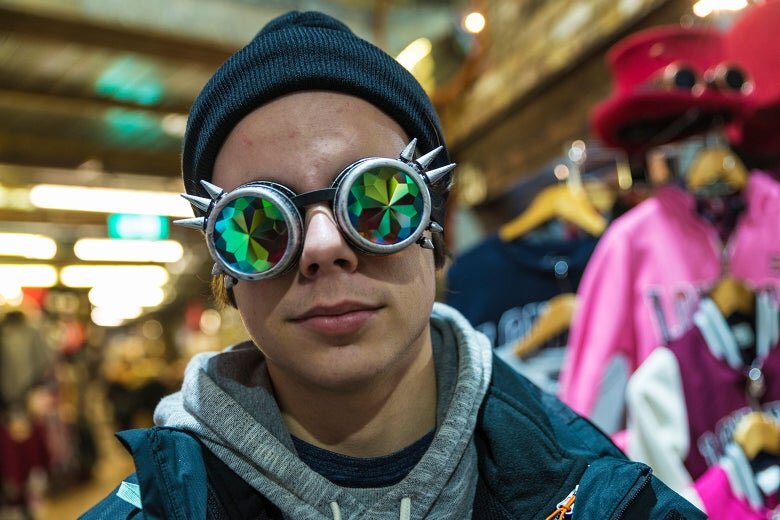Cyberpunk is over. Solarpunk's stories helped us grasp climate change. But the hopepunks seek to raise our spirits
A powerful blog (on LitHub) from a literature teacher, who looks to two new SF genres - Solarpunk and Hopepunk - to give her students some viable options for progress, in otherwise oppressively pessmistic times.
An extract:
We are constantly bombarded with messages of “climate catastrophe,” “cataclysm,” and, my least favorite, “apocalypse.” We are in the crisis now and we need, as ecofeminist scholar Donna Haraway says, to stay with the trouble. In order to do so, we need narratives that are not naively optimistic about the future of our species and the others that inhabit this planet alongside us.
We desperately need narratives that move past apocalypse as an endpoint, not only because there are people and societies already living in the Western world’s vision of climate apocalypse on a daily basis, but because looking at the climate crisis as an apocalypse can only inspire a helpless waiting for the post-apocalypse to arrive, suddenly, to cleave the past from the future.
Climate is not weather, weather is not climate, and we don’t do ourselves any favors by thinking that climate scientists can provide us with an appropriately optimistic or apocalyptic forecast for our postcode 18 months or 5 years from now. Instead we need stories that showcase a variety of possible futures, from the bleak to the hopeful.
We desperately need narratives that move past apocalypse as an endpoint.
This is where I look towards speculative fiction, as a writer and reader, to a genre that dabbles in both presents and futures. Pushback against a trend of apocalyptic, dystopian climate futures has inspired the speculative sub-genre solarpunk, which grew out of posts on the social media site Tumblr in the early 2010s.
Solarpunk, both a lifestyle and a cultural movement, focuses on green and eco-friendly futures made possible by eliminating fossil fuel energy in favor of solar power and bio-inspired design. It may or may not be wholly utopian, but it certainly aspires to be beautiful, green, and colorful, an aesthetic that frequently mashes together the elegance of Art Nouveau with the wildness of permaculture.
While solarpunk as a genre hasn’t yet grasped hold of speculative fiction readers in the same way its predecessors cyberpunk and steampunk did, its short story anthologies, like The Weight of Light (produced through ASU’s Center for Science and Imagination) and Sunvault, and its writers, like Andrew Dana Hudson, have produced compelling visions of the future.
While I find the fashion, architecture, and energy proposals of solarpunk inspiring, I am looking for narratives that offer me something besides absolute optimism or total despair.
Enter hopepunk, a term coined by Alexandra Rowland in 2017 to describe genre fiction that is the opposite of the ever-popular grimdark everything-sucks-and-is-terrible mentality. Hopepunk stories are not specifically climate-focused and, more importantly, do not necessitate hopeful worlds.
In the age of Trump, this basic act of extending to another person kindness, rather than disdain or vitriol, becomes a political narrative, found in the writings of speculative fiction writers Becky Chambers and Cat Rambo, among others. (If This Goes On: The Science Fiction Future of Today’s Politics, an anthology of speculative fiction shorts edited by Rambo and published this past March, was conceived from her tripartite of “rage and sorrow and hope.”)
Speculative literature could do worse than to broaden its spectrum of proffered climate futures from the dystopian, apocalyptic, and the grimdark, to include those where hopepunk is still necessary in the midst of a changing climate, and even to the optimistic futures of the solarpunks.
I find myself appreciating hopepunk. 3, or 5 degrees Celsius of warming—what can we handle and how can we know?—means that we will probably lose things (species, homes, people) that we planned to save.
The narratives we construct, the stories we tell ourselves must acknowledge that, while there’s a scientific consensus that the atmosphere is warming due to our fossil fuel emissions, many aspects and extents of climate change remain uncertain.
Writing non-apocalyptic climate change narratives can make room, intellectually and emotionally, for our failures to act sooner. Some things will be lost; much already has been.
I want to say to my students: Even if it is already too late, we have no way yet of knowing it is, because I am afraid they will still give up.
More here. We have covered the power of science fiction to shift our emotions about action in the present many times on the Daily Alternative. And for Trekkies out there: Captain Jean-Luc Picard may be the very quintessence of Hopepunk.

